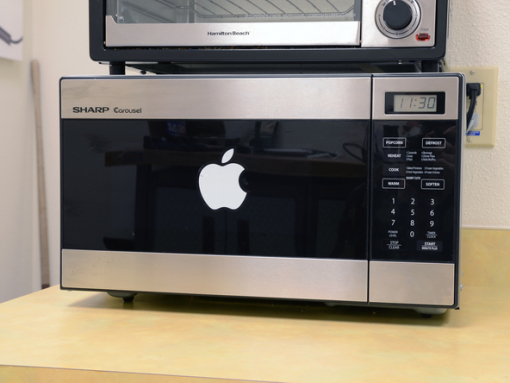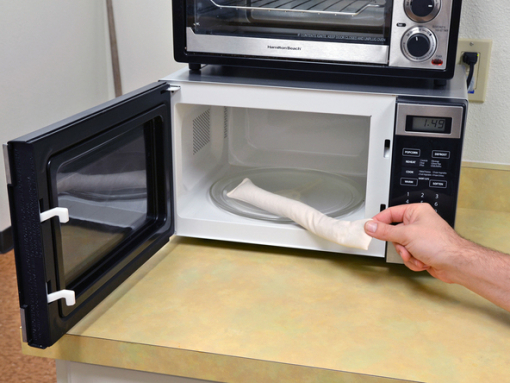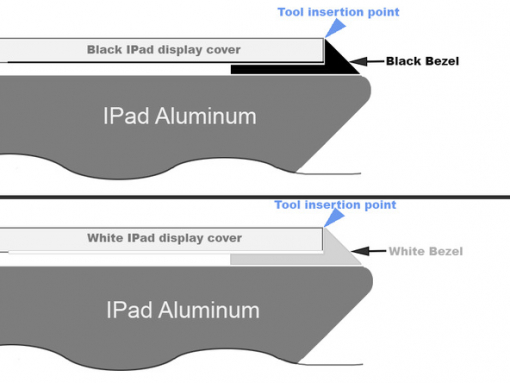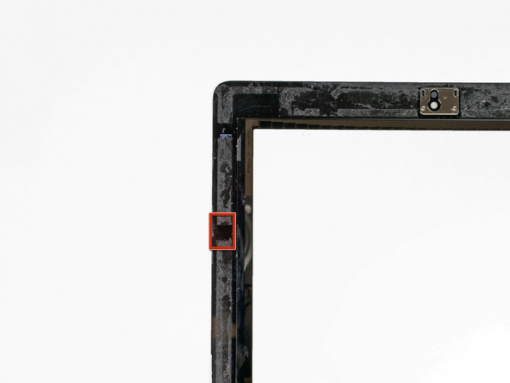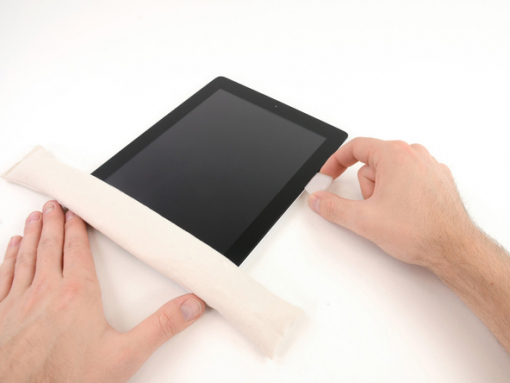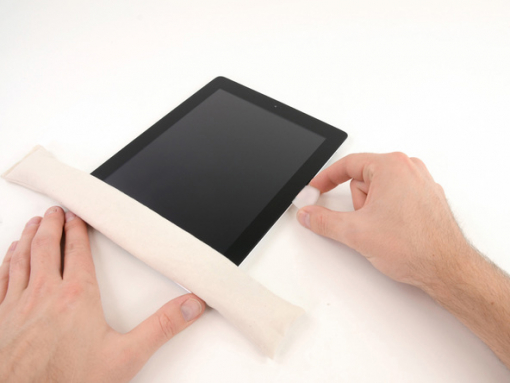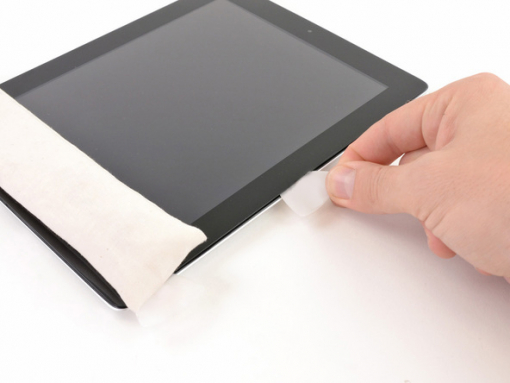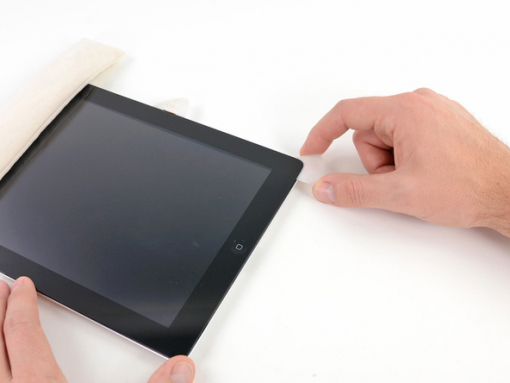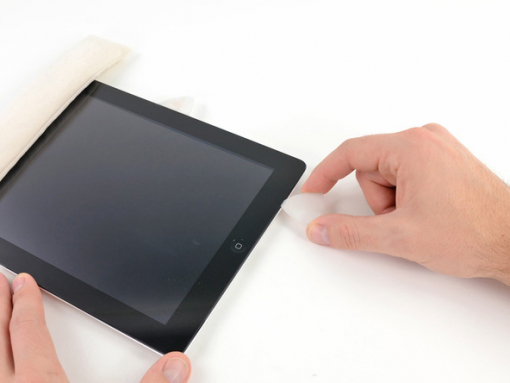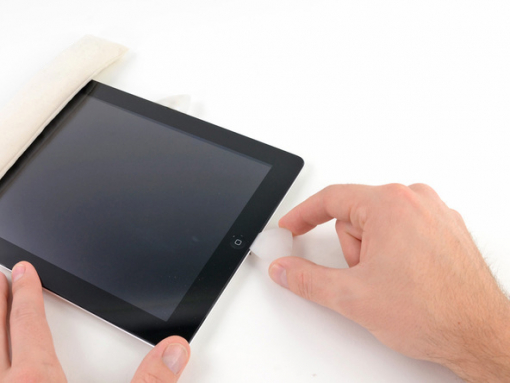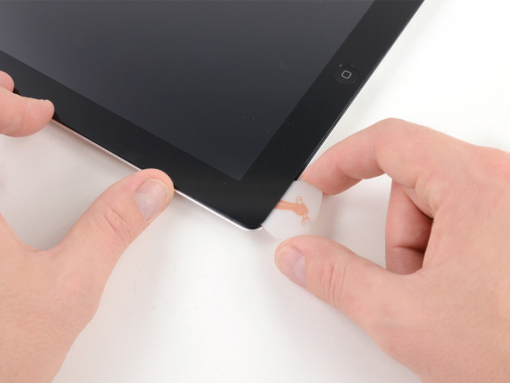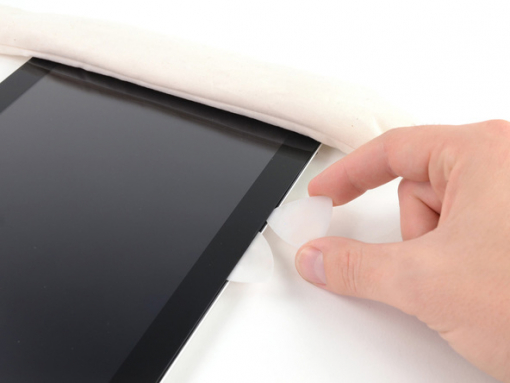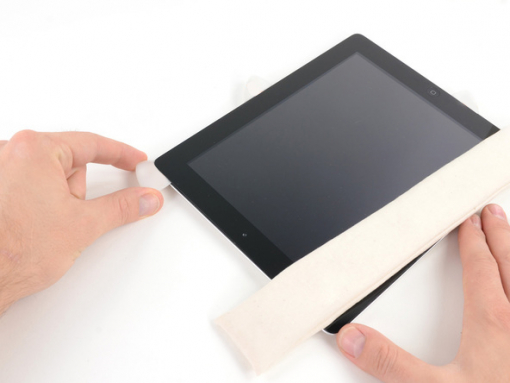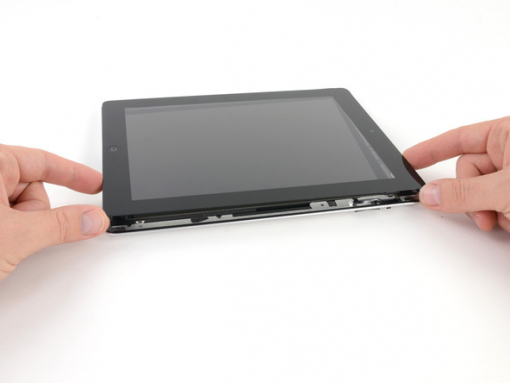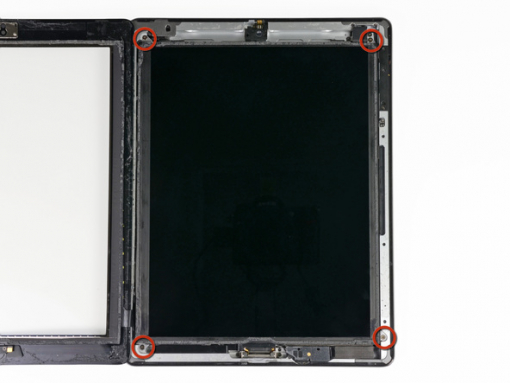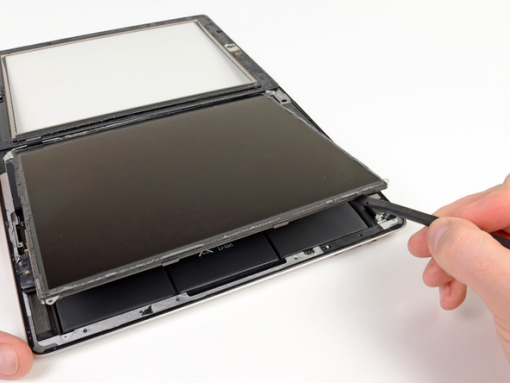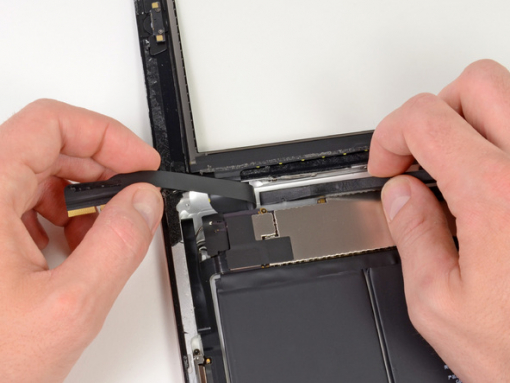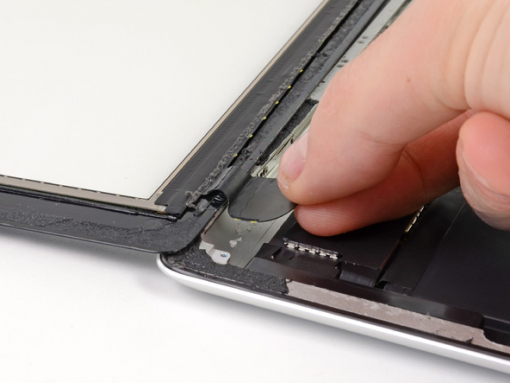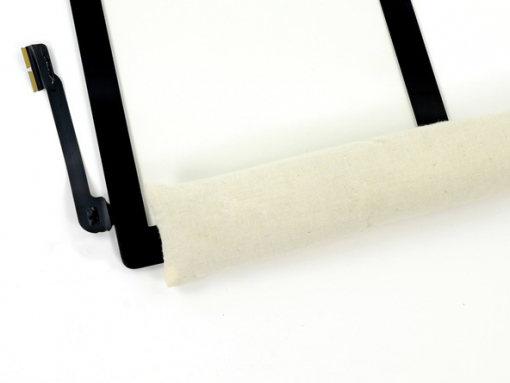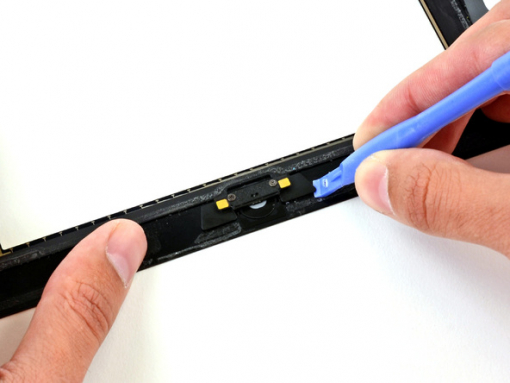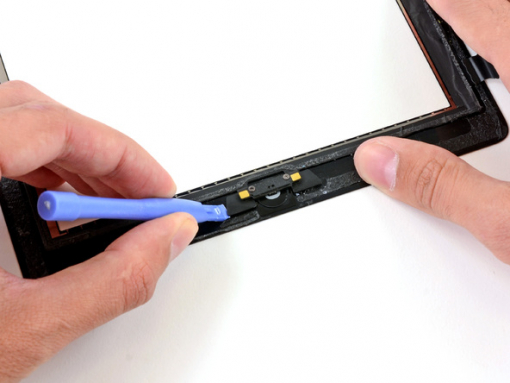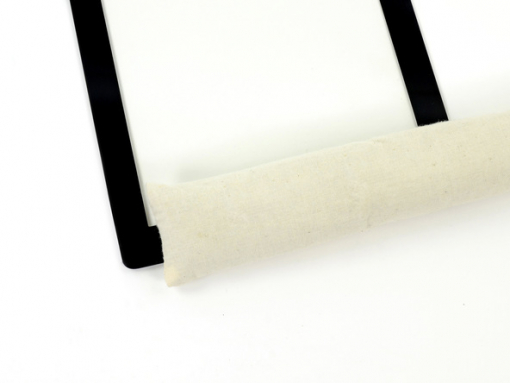Installing iPad 3 Wi-Fi Camera Bracket



Step 1 - Front Panel
First thing you are going to need is a microwave, which you will use to heat the iOpener, an insulated bag that will transfer heat to the adhesive strips around the iPad's screen.
It is highly advisable to clean your microwave before proceeding, because sticky and messy substances that can be found on the bottom of the microwave may end up stuck to the iOpener.
Put the iOpener in the microwave and leave it there for one minute on the highest power setting.
It is very important not to overheat the iOpener during the repair procedure. If you need to reheat the iOpener, it is advisable to wait at least two minutes before doing so.
If the iOpener has not been heated for some time, or this is the first time you are using it, it is advisable to microwave the bag wrapped in a damp paper towel. This way, contents of the bag will not burn in case of accidental over-microwaving.
Step 2
Hold the iOpener by one of the corners and take it out from the microwave.
The bag will be quite hot, so be very careful when handling it.
Step 3
During the repair procedure, you will probably have to deal with broken glass, so it is advisable to wear safety glasses, which will provide protection from flying shards.
If you need to remove a cracked screen, we suggest you to place a clear packing tape over the glass, as it will hold it together while you work and at the same time, it will minimize the mess.
In order to have a good contact between the surface of the iPad and the iOpener, you will need to place the iOpener flat on the right edge of the iPad, smoothing it out at the same time.
Before you try to open the front panel, allow the bag to sit on the iPad for approximately 90 seconds.
Step 4
It can be rather difficult to see the separation between the glass and the bezel, so you need to be very careful and place the tool in the proper spot.



Step 5
Upper right corner of the iPad contains a small gap in the iPad's adhesive ring, approximately 2.0 inches (~5 cm) from the top of the iPad. This is something you are going to exploit.
Place the tip of a plastic opening tool into the gap between the front glass and the plastic bezel. All you need to do is insert only the tip of the opening tool, just enough to widen the crack.
Getting the wedged tip of the opening tool between the glass and plastic may require some force. You must do it very patiently and carefully, wiggling the plastic opening tool back and forth as necessary.


Step 6
Slide a plastic guitar pick in the gap, right next to the plastic opening tool while keeping the tip of the plastic opening tool wedged between the front glass and plastic bezel.


Step 7
Plastic opening tool now needs to be removed from the iPad, and once you do it push the guitar pick further underneath the front glass to a depth of ~0.5 inches.
Step 8
Reheat the iOpener, and place it again on the bottom edge of the iPad. You should do this while you try to release the adhesive on the right side of the iPad.



Step 9
You should begin with releasing the adhesive from the right edge of the iPad while you use the iOpener to heat the bottom edge.
Slide the guitar pick down along the edge of the iPad, releasing the adhesive as you go.
You should do this very carefully because the adhesive is very strong, and some serious force may be needed.
If the tip of the guitar pick can be seen underneath the front glass, you should pull the guitar pick out just a little bit. Although using the guitar pick this deep will not damage anything, adhesive residue may appear all over the LCD.



Step 10
You may have to move the heated iOpener back onto the right edge of the iPad as you release the adhesive. This depends on how long the iPad has been able to cool while you were working on it.
In case the guitar pick gets stuck in the adhesive, "roll" the guitar pick along the side of the iPad, continuing to release the adhesive.


Step 11
Prior to removal of the first guitar pick from the bottom corner of the iPad, insert a second guitar pick under the right edge of the front glass in order to prevent the adhesive from adhering again.
It is time to heat the iOpener again, and move it to the top edge of the iPad.
Step 12
You will need to be extremely cautious during the next few steps.
Screws and a cable secure Wi-Fi antenna to the bottom right edge of the iPad rear case. It is of utmost importance to proceed with caution because of the orientation of the Wi-Fi antenna; otherwise you may cause irreversible damage to the Wi-Fi antenna.
It is important to follow the next steps carefully, because you will have to release the adhesive securing the antenna to the front panel. You must be careful and try not to damage the delicate parts attaching the antenna to the bottom of the iPad.


Step 13
Release the adhesive as you slide the guitar pick around the bottom right corner of the iPad.
You may damage the Wi-Fi antenna if you slide the guitar pick further than the bottom right corner.


Step 14
Now it is time to move the guitar pick along the bottom right edge of the front panel. If the adhesive is not released properly, Wi-Fi antenna can be easily severed because it is placed very close to the corner.
Pull the guitar pick out just a little bit and do not remove it completely from under the front glass; approximately ~1/8" of the tip should be left under the front glass.
Release the adhesive underneath the Wi-Fi antenna as you slide the tip of the guitar pick along the bottom edge of the iPad.


Step 15
The guitar pick should be inserted again to its full depth once you have moved past the Wi-Fi antenna (approximately 3" from the right edge, or right next to the home button).
Release the adhesive securing the Wi-Fi antenna to the front glass as you slide the guitar pick to the right.
Screws and a cable secure antenna to the bottom of the iPad. Antenna will be detached from the front panel in this step, making sure that when you remove the panel, antenna will not be damaged.



Step 16
Proceed with releasing the adhesive along the bottom of the iPad, pulling the guitar pick out far enough to go around the home button, and re-inserting it once the guitar pick is past the home button.
You will need to microwave the iOpener again and reheat the adhesive where you are working in case the adhesive has cooled too much along the bottom edge.
It is important not to heat the iOpener more than a minute at a time, and you should always have at least two minutes break before heating it again.


Step 17
Proceed with releasing the adhesive all the way along the bottom edge of the iPad.
Guitar pick should be left wedged underneath the front glass near the home button.



Step 18
Insert another guitar pick adjacent to the placeholder guitar pick underneath the right edge of the iPad.
Release the adhesive as you slide the guitar pick towards the top of the iPad.
Step 19
In order to start warming the adhesive on the left edge of the iPad, you will need to reheat the iOpener in the microwave and set it on that section.



Step 20
Slide the guitar pick along the top edge of the iPad, pulling it out a little bit to go around the front-facing camera bracket.
Fair amount of force may be needed as the adhesive along this section is very thick. Work carefully and slowly, and try not to slip and hurt yourself or damage your iPad.
Replace the iOpener along the top edge and continue working in case the adhesive has cooled too much. Also, heat the iOpener again if it has cooled too much.
You will have to "roll" the guitar pick as shown in step 9 in case it gets stuck in the adhesive.


Step 21
Slide the guitar pick around the top left corner as you proceed with releasing the adhesive along the top edge of the iPad.
Now you can remove the iOpener from the iPad for convenience in case the adhesive is warm enough. But in case the adhesive is still quite sticky, you will need to heat the iOpener again and lay it on the left edge while you work.



Step 22
Release the adhesive as you slide the guitar pick along the left edge of the iPad.
The digitizer cable is placed approximately 2" from the bottom of the iPad. When you get ~2.25" from the bottom of the iPad, you should stop sliding the guitar pick.


Step 23
Now you can release the adhesive along the bottom left corner by using the guitar pick that is still underneath the bottom edge of the iPad.
Work very carefully and slowly, and be careful not to damage the digitizer cable, as its bottom is placed only ~1" from the bottom of the iPad.


Step 24
Using one of the guitar picks, pry up the bottom right corner of the iPad and grab it with your fingers.
In case that the adhesive along the perimeter of the iPad has stuck back down again, slide a guitar pick underneath the edge of the iPad where the front glass is still stuck and "cut" the adhesive.


Step 25
Rotate the front glass away from the iPad by holding the tablet by the top and bottom right corners.
Some adhesive may still be attached, so make sure to use a guitar pick in order to cut any adhesive that may still be holding the front panel down.
Step 26 - Front Panel Assembly
Back to top
Four 2 mm Phillips #00 screws securing the LCD to the aluminium frame need to be removed.



Step 27
Lift the right edge of the LCD out of the iPad by using a plastic opening tool or a spudger.
Rotate the LCD along its left edge and lay it down on top of the front panel.
The ribbon cable is fragile and may break if it is flexed too much, so you need to be really careful as you move the LCD.
Step 28 - LCD
Back to top
Peel back the piece of tape covering the LCD ribbon cable connector using the tip of a spudger.



Step 29
Flip up the retaining flap on the LCD ribbon cable ZIF connector.
Pull the LCD ribbon cable from its socket on the logic board using your fingers or a pair of tweezers.
Step 30
Make sure not to touch the front of the LCD while you slowly lift the LCD off the front panel.



Step 31
You may need to peel back the piece of tape that secures the digitizer ribbon cable to the logic board.
Flip up the retaining flap on both of the digitizer ribbon cable ZIF connectors.


Step 32
Loosen the adhesive underneath the digitizer ribbon cable using the flat end of a spudger.
Pull the digitizer ribbon cable straight out of its sockets on the logic board.


Step 33
Adhesive securing the cable to the rear aluminium case can be released by peeling back the digitizer ribbon cable and using the flat end of a spudger.
Step 34
Pull the digitizer ribbon cable out of its recess in the aluminium frame using your fingers.
Remove the front panel from the iPad.
Step 35 - Home Button Assembly
Back to top
Adhesive is used to attach the home button assembly to the front panel. We recommend you to use an iOpener to soften the adhesive.
Place the iOpener in the microwave and microwave it for one minute on the highest power setting.
Make sure not to overheat the iOpener during the repair procedure. If you need to reheat the iOpener, it is advisable to wait at least two minutes before doing so.
Place the iOpener over the home button on the front edge of the display.


Step 36
Wedge the plastic opening tool under the right side of the home button assembly and pry upwards, releasing the adhesive on that side.


Step 37
Release the adhesive on the left side of the home button using the technique above.
Lift the home button mount off of the front panel.



Step 38
Insert the edge of plastic opening tool underneath the edge of the home button mounting bracket.
Release the adhesive as you slide the plastic opening tool along the retaining spring bracket.
Remove the home button with mounting bracket from the front panel.
Step 39 - Camera Bracket
Back to top
It is highly advisable to use an iOpener in order to soften the adhesive, because the camera bracket is attached to the front panel by adhesive.
Place the iOpener in the microwave and microwave it for one minute on the highest power setting.
Make sure not to overheat the iOpener during the repair procedure. If you need to reheat the iOpener, it is advisable to wait at least two minutes before doing so.
Place the iOpener over the front facing camera on the front edge of the top of the display.







